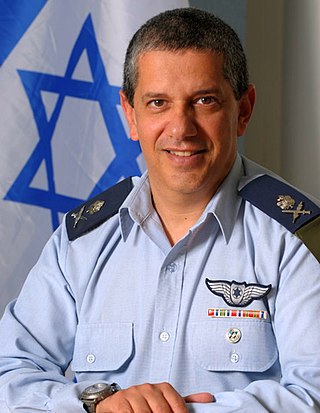
The 1st "Golani" Brigade is an Israeli military infantry brigade. It is subordinated to the 36th Division and traditionally associated with the Northern Command. It is one of the five infantry brigades of the regular Israel Defense Forces (IDF), the others being the Paratroopers Brigade, the Nahal Brigade, the Givati Brigade and the Kfir Brigade. Its symbol is a green olive tree against a yellow background, with its soldiers wearing a brown beret. It is one of the most highly decorated infantry units in the IDF. The brigade consists of five battalions, including two which it kept from its inception, one transferred from the Givati Brigade (51st).

The 84th "Givati" Brigade is an Israel Defense Forces infantry brigade formed in 1947.

The Negev Brigade, originally the 12th Brigade is an Israeli reserve infantry brigade under the Sinai Division, that originally served in the 1948 Arab-Israeli war.

Haim Laskov was an Israeli public figure and the fifth Chief of Staff of the Israel Defense Forces.

Tzvi Tzur was an Israeli officer who served as the IDF's 6th Chief of Staff (1961–1963).

Yekutiel "Kuti" Adam was an Israeli general and former Deputy Chief of Staff of the Israel Defense Forces.

Gadi Eisenkot, also spelt Eizenkot, is an Israeli general and politician from the Israeli National Unity party. He served as the 21st Chief of Staff of the Israel Defense Forces from 2015 to 2019 and from 2023 to 2024, as a minister without portfolio in Israel's unity government. Eisenkot, who grew up in Eilat, pursued maritime studies and later served in the IDF's Golani Brigade. He holds a B.A. in History from Tel Aviv University and a post-graduate degree in Political Science from Haifa University. Married with five children, he resides in Herzliya. One of his sons, Gal, was killed in action during the 2023 Israel-Hamas war.

The Battle of Bint Jbeil was one of the main battles of the 2006 Lebanon War. Bint Jbeil is a major town of some 20,000 inhabitants in Southern Lebanon. Although Brig.-Gen. Gal Hirsch announced on 25 July that the Israel Defense Forces (IDF) had "complete control" of Bint Jbeil, this statement was later discredited. In spite of three sustained attempts by the IDF to conquer the town, it remained in the hands of Hezbollah until the end of the war. The town was the scene of some of the fiercest fighting of the war, with both sides taking heavy losses. Three senior Israeli officers, including Major Roi Klein, were killed in the battle. Hezbollah similarly lost several commanders, most notably Khalid Bazzi, commander of the Bint Jbeil area.

Tal Rousso is a general of the Israel Defense Forces, serving in the reserves. He heads the IDF's Depth Corps. He also served as an MK for the Labor Party.

Operation Pleshet was an Israeli military action near the village of Isdud from May 29 to June 3, 1948 during the 1948 Arab–Israeli War. Isdud was on the Israeli southern front against the Egyptian Army, and the operation was aimed at capturing the village and stopping the Egyptian advance northwards. While only the June 2–3 engagements are officially named Operation Pleshet, the events immediately preceding are historiographically joined with it.

Amir Drori was an Israeli general, founder and the first director general of the Israel Antiquities Authority.

The Etzioni Brigade, also 6th Brigade and Jerusalem Brigade, is an infantry brigade of the Israel Defense Forces. It was founded in late 1947 as the Field Corps unit responsible for the defence of Jerusalem and its surroundings, where it operated during the 1948 Arab–Israeli War along with the Harel Brigade. Its first commander was Yisrael Amir, who was replaced by David Shaltiel.

Uri Sagi is an Israeli retired general who held several prominent posts including commander of the Golani Brigade and chief of the IDF's Military Intelligence Directorate.

Amir Eshel is a former Israeli general who served as commander of the Israeli Air Force and served as Director General of the Israeli Ministry of Defense until January 2, 2022.

Jehuda Lothar Wallach was an Israeli military officer and military historian.

Gideon (Gidi) Eilat (1924–2015) was a former member of the Palmach, commander of the third battalion of the Yiftach Brigade during the 1947–1949 Palestine war. He was active in the Kibbutz Artzi movement, one of the founders of the Civil Guard of the Israel Police Department, and a member of Kibbutz Beit Alfa.

Ghassan Alian is an Israeli-Druze officer in the IDF and the current head of the Coordinator of Government Activities in the Territories. Aluf by rank, he has previously served as Central Command's executive officer and head of the Israeli Civil Administration. Alian is one of the highest ranking Druze in the IDF and has served since 1990.

Yoel Strick an Israeli Major General (Aluf) in the IDF reserves and formerly commanded the Ground Forces Command.

Tamir Yadai is an Israeli major general (aluf) who commands the Ground Forces Command of the Israel Defense Forces (IDF).

Asaf Hamami was an IDF officer with the rank of colonel, serving as the commander of the Southern Brigade in the Gaza Strip. Prior to that, he served as the commander of the Negev Brigade, commander of the Oz Brigade training school, and commander of the Tzabar Battalion.



















